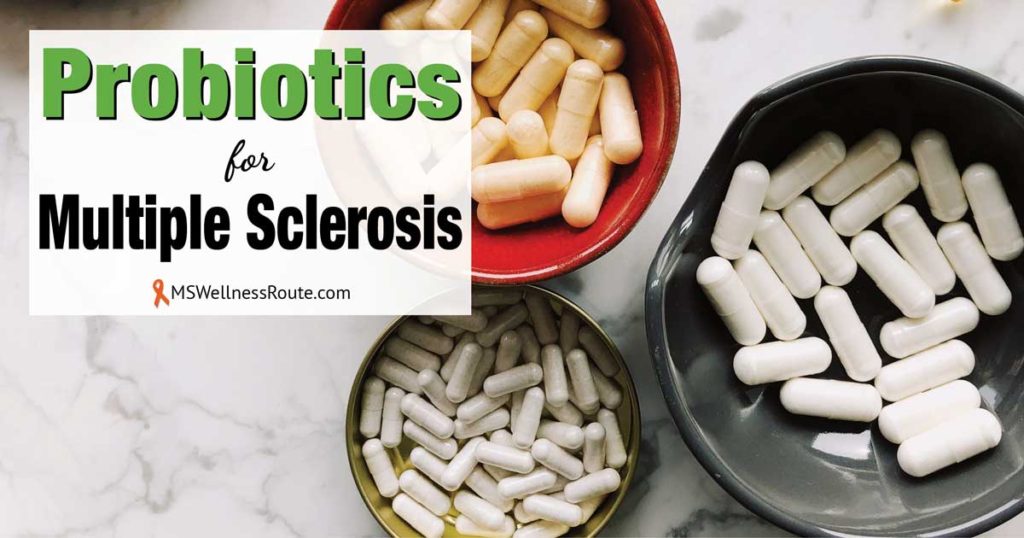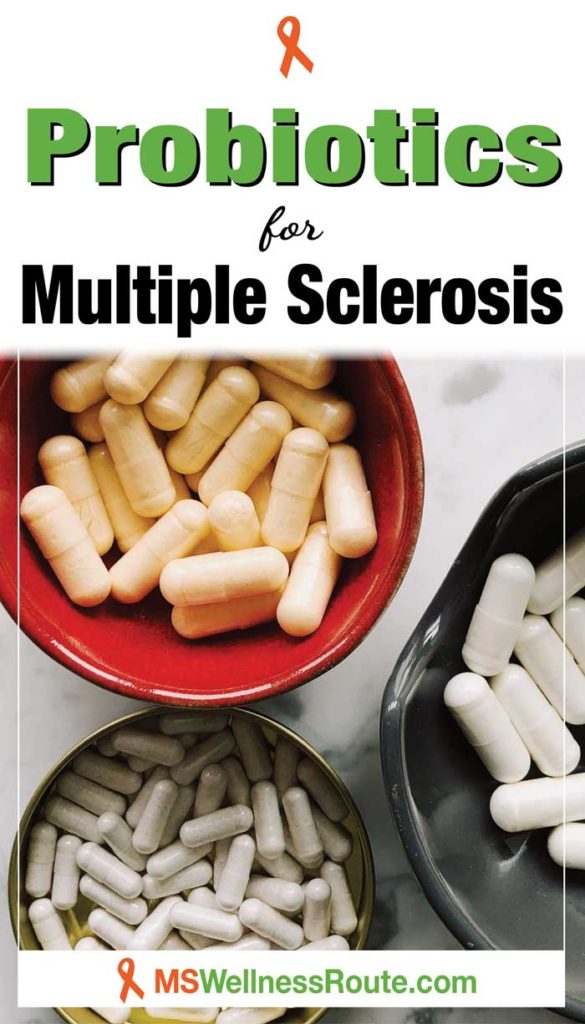Last Updated on December 5, 2023 by Cathy

Gut health is a very popular subject right now and for good reason. Many studies linked poor gut health to multiple sclerosis (MS). Unfortunately, there are so many probiotics to choose from it makes it hard to know which one is right for multiple sclerosis.
So what makes a healthy gut?
It is the live bacteria that are living in your gut both good bacteria and bad bacteria. These “good bugs” help support a healthy gut and immune system and help prevent illnesses. Unfortunately, people with MS are usually lacking in good bacteria. Plus, many patients have an overgrowth of the bad bacteria yeast called Candida.
It is still a mystery why this happens. MS is not hereditary but several genes play a role. I am the only one in my extended family with MS yet my DNA showed I had a three times higher risk for MS.

Even though a person is possibly predisposed to MS. Researchers believe it is environmental factors, such as diet or antibiotics, that change the gut bacteria and trigger MS.
Triggers to MS:
- Poor Diet
- Infections (bacteria, parasites, viruses, and yeast overgrowth)
- Environmental toxins (heavy metals, mold, pesticides, etc.)
- Chronic stress
- Hormones (adrenaline, cortisol, etc.)
Antibiotics are the main culprit for this unbalance. When you take an antibiotic it kills off not only the bad bacteria but also kills off the good bacteria. Candida is not affected by antibiotics so it now has room to grow out of control.
Gut Bacteria and MS
Your gut not only digests food, but it is also an essential part of the immune system including the brain. When your gut bacteria is out of balance, it can cause a lot of health problems. From depression to autoimmune diseases. Researchers discovered people with MS have higher levels of inflammatory bacteria. Patients also had lower levels of good bacteria compared to healthy people.
Researchers found patients with MS had increases in two particular bad bacteria, Akkermansia and Methanobrevibacter. They also had one less good bacteria, Butyricimonas, compared to healthy individuals. Methanobrevibacter produces methane which is in the breath of MS patients. Breath analysis for methane was once considered a way of diagnosing people with MS.
Researchers believe this unbalance of bacteria could be the link that triggers MS. It could also be the link that determines the progression of MS. More studies on the gut microbiome and MS is currently underway. Researchers are looking into if probiotics could someday be used as a treatment.
Studies
Several studies linked the importance of the gut microbiome in MS. One study was from the Ann Romney Center for Neurologic Diseases. It included nine MS patients and 13 controls. They gave the prescription form probiotic VSL3 to the participants.
The participants took VSL3 twice daily, a total of 3600 billion CFU per day, for two months. They were allowed to eat whatever so they were not under any dietary restrictions. During the probiotic use, blood and stool tests showed changes in the gut that matched those of the healthy controls. Researchers also looked into what was happening in the brain. It showed there was less inflammation.
However, after patients stopped the probiotic, tests showed the bad bacteria were increasing and the good bacteria were decreasing. The study stated, “We are seeing an immune effect in the blood.” So what does this mean? Researchers are still unsure.
The study used a prescription form of VSL3 with the brand name Visbiome in the United States and Vivomixx in Europe. You will need to visit your doctor to get the prescription form. You can purchase their 112.5 billion per capsule or 450 billion per packet without a prescription.
Probiotics for Multiple Sclerosis
Probiotics, good bacteria, are also found in fermented foods. Stay away from most commercial brands, they have gone through processing which strips away the beneficial probiotics. It is best to make your own but if you do purchase one look for raw organic unpasteurized. Check out my easy sauerkraut recipe.
Foods with Probiotics:
- Apple cider vinegar
- Beet kvass
- Coconut milk kefir
- Fermented vegetables (carrots, pickles, sauerkraut, etc.)
- Kombucha
- Miso
- Natto
If you are first starting out with a healthy diet, it is best to avoid all fermented foods for the first three months. Then when your body has started to get stronger you can go ahead and introduce fermented foods. Start small like a half tablespoon each day so your gut can get used to them.
When you have a microbial imbalance be careful when introducing fermented foods. Sauerkraut is a great fermented food to start out with since it causes very few problems. Kombucha, on the other hand, can also create a histamine reaction so you may need to avoid it together. Watch for signs such as burping or bloating.
Once you start including fermented foods beware of wild fermentation. They create bacteria where there is no way of knowing what they are. The majority of people with MS also have Candida overgrowth. Candida can feed on these types of bacteria which is exactly what you are trying to stop.
Quick Links To information In This Article:
• DNA Test for Multiple Sclerosis
• The Connection Between MS and Candida
Finding Probiotics for Multiple Sclerosis
Eat a wide variety of fruits and vegetables to get the most probiotic benefits. Avoid unnecessary antibiotics that kill good bacteria, especially in conventional meats. Your gut and body will be very happy.
Researchers still don’t know which probiotic supplements are best. They are currently looking into which bacteria would be best for patients with MS. Until then, look for Lactobacillus and Bifidobacterium strains.
If you haven’t taken probiotic supplements start with fewer bacterial strains. Then you can work your way up. Also, if you are taking any antifungals for Candida, make sure you take the probiotic supplement at a different time of day.

Get Your Free How to Find a Probiotic for Multiple Sclerosis:
Get the password for the library including my How to Find a Probiotic for Multiple Sclerosis here by filling out this form:
Want to remember this? Pin it to your favorite Pinterest board!

Resources: https://www.ncbi.nlm.nih.gov/pubmed/29307299
Finding Probiotics for Multiple Sclerosis





